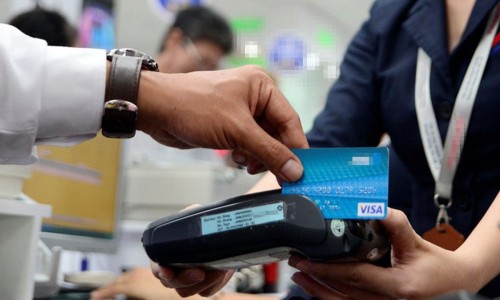 (Photo: VNA) (Photo: VNA) |
MoMo, the best known e-wallet in Vietnam, for example, now has 10 million users, 100,000 partners, and more than 100,000 Points of Sales (POS). It is attracting more users by cooperating with banks and creating more payment points and offline and online services.
Nguyen Ba Diep, MoMo Vice Chairman, said: “It’s not easy to change consumers’ habits. We’re glad that the government has greatly supported cashless payment. The e-wallet service was launched a decade ago and MoMo has been patiently following this trend.”
Against the boom of non-cash payments, competition in Vietnam’s credit card market has become stiff. Foreign and domestic banks as well as finance companies are carrying out cash back programs and free use in the first year, and work with restaurants, hotels, and travel agents to offer discounts for credit card users.
VPBank has offered cards for businesses, according to Le Thi Diem Phuong, Director of VPBank’s Corporate Cards and Partners Development for Small and Medium Enterprises Division.
“It often costs a company up to 15% for cash management. 92% of a business’s goods purchases are paid manually which adds 5% to its operating costs. Based on a company’s needs and problems, we offer solutions to help the buyer pay as late as possible and the seller collect payment as quickly as possible,” said Phuong.
Vietnam's interbank e-payment system handled transactions worth 3.1 trillion USD last year, a 25% growth compared to the previous year. Mobile payments grew nearly 170% compared to 2017.
According to the Global Consumer Insights Survey 2019 by PwC in 27 territories and countries, mobile payments in Vietnam are growing the fastest globally.
As non-cash payment begins to be used more for public services like healthcare and education, the ratio will surely rise.
Pham Tien Dung, Director of the State Bank of Vietnam’s Payment Department, said: “We have proposed that the government develop a comprehensive database and share it to facilitate payments for public services. The IT systems of public service providers should be integrated and upgraded to be compatible with e-payment solutions.”
Deputy Prime Minister Vuong Dinh Hue said the government has benefited from the switch to online payments which will enhance the economy’s transparency and increase access to banking and financial services for all people.
“As non-cash payments grow, it will narrow the gap with other regional countries and contribute to the growth of the service sector. Cashless payments should be popularized with a financial inclusion strategy so that all citizens can use the services. Rapid development and universalization should go together,” said Mr. Hue.
According to a Government plan on non-cash payment, the ratio of cash transactions in Vietnam should be reduced to below 10% by the end of next year.